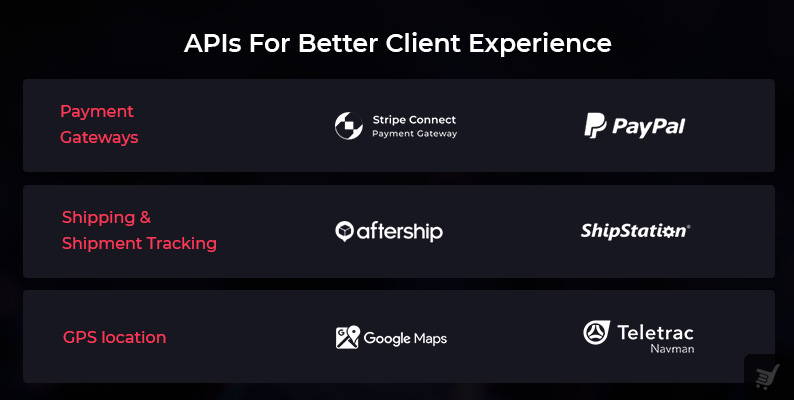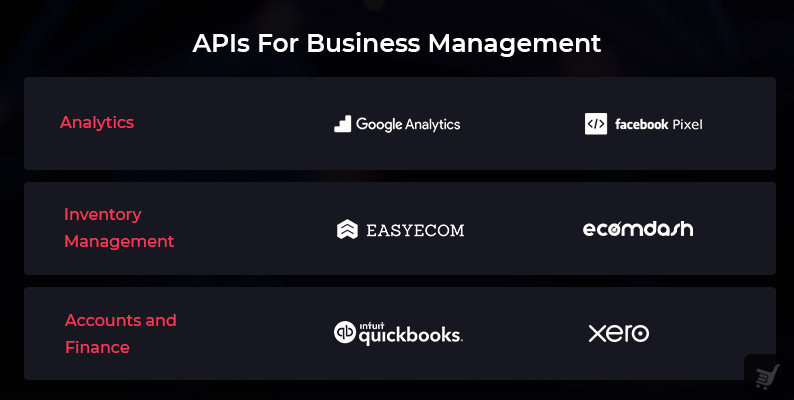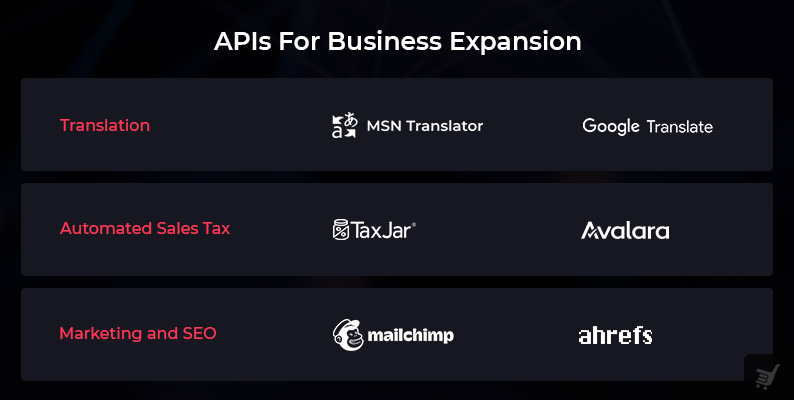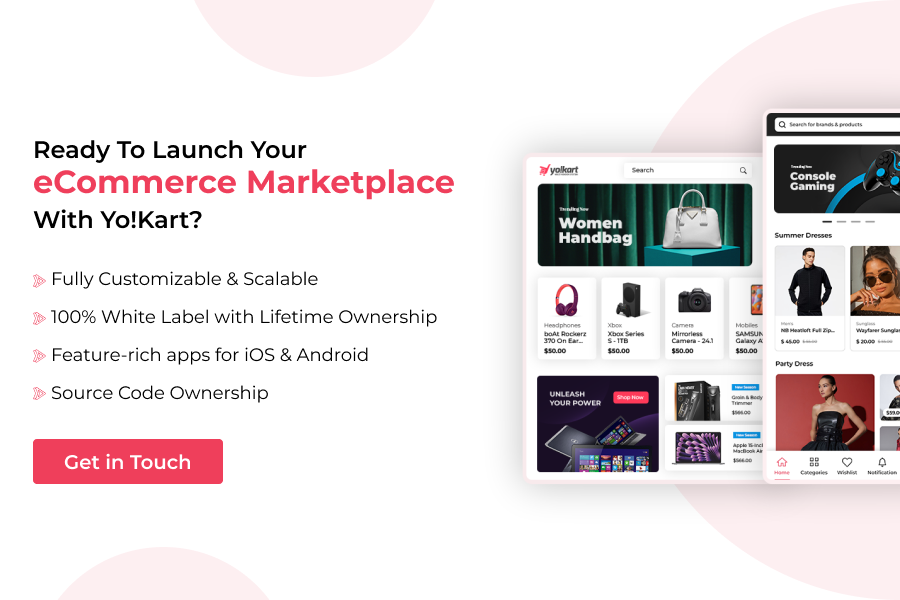The eCommerce industry has seen steady growth in the last few years. Bolstered by technological and logistical advancements the sector presents multiple opportunities for startups to start selling through the online channel.
Trying to build an eCommerce website from scratch will require both time and resources. To expedite the process, startups can utilize turnkey eCommerce solutions that enable businesses to be up and running with an online business within a short time span.
eCommerce experience for the buyer has evolved over the years. Marketplaces like Amazon, eBay, Etsy offer a comprehensive virtual shopping experience to the buyer through a host of features, functionalities, and services.
A startup can also offer similar services or experience to their buyers by integrating various third-party tools. This integration is achieved through an Application Programming Interface or API of third-party software.
Along with enhancing buyer experience, API integrations also facilitate managing and marketing the eCommerce business for the admin of the marketplace.
Most modern eCommerce marketplace software like Yo!Kart are flexible and allow integrations with multiple APIs.
It will be ideal for an entrepreneur to understand the benefits that APIs bring forth and identify which ones are quintessential to your eCommerce marketplace. We have compiled all the necessary information regarding eCommerce integrations, read ahead to find out.
Business Benefits of API Integrations
An online store or marketplace requires multiple business processes to function in cohesion. Some of these are business accounting, finance management, marketing, analytics, GPS services to name a few. eCommerce integration tools enhance the functionalities of an online marketplace, enabling these business processes to run seamlessly, resulting in many benefits.
Some of these benefits are discussed below:
Automation
Some Marketplace integrations can be configured to enable the automation of marketplace functions. Automation simplifies the complexities of processes and adds value to the e-business.
For instance, imagine a scenario where there are hundreds of sellers in a multi-vendor platform. A marketplace owner manually transferring the outstanding payments to each account of the sellers will be a time-consuming process. This process can be easily streamlined with the integration of split payment gateway like Stripe Connect, saving the company precious time and resources.
Automation increases efficiency, reduces manpower costs for the marketplace owner and the vendors, and reduces errors a manual process might entail
Once the eCommerce store scales up, automation is the best option to assist in most of the e-business’ functions.
Unified Platform
These integrations enable the admin of the marketplace to control the business processes without having to leave the platform, further increasing efficiency. All processes of the marketplace are centralized and unified.
A unified platform also streamlines the workflow of the marketplace.
For instance, if the accounting API is integrated with the marketplace, each order placed on the marketplace will be automatically updated in the firm’s accounts.
This will eliminate errors, fasten the process, and most importantly, changes in the accounts would happen vis-a-vis changes in the order system of the marketplace.
Better Customer Experience
Ecommerce shopping has leveraged a unique shopping experience to the customers. An eCommerce platform can be customized via marketplace integrations to enhance buyer experience.
For instance, customers get to search for products or services based on their location, personalizing the shopping experience. They can pay via payment modes that are convenient to them. The customers can also get live product-tracking information. These are some features that enhance the buyer experience. These features can be facilitated by marketplace integrations.
A better buyer experience leads to better conversion rates and increases customer loyalty by making the customer look forward to shopping from the marketplace.
Enhanced Business Opportunities
The biggest boom of eCommerce is that it doesn’t confine a business to a particular geographical location as a physical store would.
However, when an eCommerce store ventures into new markets to enhance the business reach, it is met by challenges of different tax structures, language barriers, and others.
eCommerce integrations bring forth functionalities like automated tax information, translation of text on the website based on location of the buyer, SEO and marketing features, and others.
These features enable a business to transcend boundaries and increase opportunities to scale up its operations by venturing into newer markets.
Facilitates Business Management
With no geographical boundaries or limit to a customer base, eCommerce businesses have the potential to scale up exponentially. Thus management capabilities required to manage the business have to also scale up along with the business.
Some of the essential management features are the following.
- Automatic inventory management
- Automatic accounts management
- Business analytics
These are some of the features that facilitate the management of an eCommerce marketplace.
Revenue Models of Marketplace Integrations
By considering all the benefits of third-party integrations, it is safe to assume that they are integral to the marketplace.
Third-party companies use multiple revenue models to charge for their services. The most popular revenue models used by these companies are as follows.
Subscription Model
The companies that implement this model charge a recurring subscription fee to the online shops that avail their services. For instance,
Volume-based Model
The companies that charge based on this model, levy a fee per transaction. For instance, payment gateways like Stripe, Paypal, and some others are free to sign up and don’t charge monthly. Rather, these payment gateways charge for each transaction that takes place on the e-store using their payment gateways.
In this case, the integration service charges increase with the volume of transactions taking place on the eCommerce store.
List of Useful API Integrations to an Online Marketplace
The scope of API integrations is possibly endless. There are multiple options to automate most functions that enable to achieve more in an online marketplace. We have prepared a list of the most important API integrations that one should consider when starting with eCommerce marketplaces. These have been classified with regard to the kind of benefit or advantage they offer:
- To enhance customer experience
- For better business management
- To expand business and scale
Integrations to Enhance the Customer Experience
Payment Gateways
A payment gateway provides for a secure environment to let the buyers make payments to purchase products or services on a marketplace. Further, it facilitates the payment to be transferred to the seller accounts.
A payment gateway enhances customer trust and is crucial to the sales conversion of a marketplace. Some popular payment gateways is Stripe, Paypal, Payoneer, and others
So, a secure and robust payment gateway should be a part of any marketplace.
Shipment Tracking Platform
The best way to fill in for the time in which a product gets delivered to the customer after they have made the purchase is to provide them with parcel delivery updates. Additionally, this information can also be used as an acknowledgment that the parcel is received at their end.
This information is accessible to the customer through shipment tracking platform integrations.
Aftership is a popular choice for shipment tracking marketplace integration.
Shipping Fulfillment Integrations
Shipping fulfillment services expedite the process of delivering a product to the customer. This reduces the time taken for the product to reach the customer. Faster shipping always enhances customer satisfaction.
An integrated API of the shipping fulfillment provider will automate the process and eliminate errors. Shipstation is an example of a shipment tracking third-party API integration.
GPS Integrations
GPS location services bring forth functionalities to the marketplace like Search, Maps, Fleet Telematics.
These help in personalizing marketplace services. Additionally, these services also aid in management of an online delivery platform.
Google maps provides these services via API integrations.

Integrations for Better Business Management
Analytics
Analytics provide useful information like visitors, sales reports, traffic and more. The information provided by these tools can be used to understand consumer behavior and determine targeted customer profiles.
This data can further help in taking future decisions regarding the business.
Google Analytics and Facebook Pixel are the popular choices for marketplace integrations that help in providing analytical information that help with business intelligence.
Inventory Management
For managing multi-channel orders and inventory level, it’s very important to centralize the inventory management. More than adequate inventory can be a temporary dead investment and means that working capital gets stuck. And less inventory means losing out on potential sales.
Moreover, an out-of-stock message might make a business lose out on a loyal customer.
Multi-channel inventory management tools like EasyEcom help an online marketplace in maintaining the right inventory and streamline the inventory management process.
Recommended Read: Yo!Kart Partners With EasyEcom For Seamless Multi-channel Selling In Online Marketplaces
Accounts and Finance
Efficient accounts keeping and finance management is the backbone of any successful business. eCommerce is no different. Bookkeeping, accounting ledgers, credit and debit statements, profit and loss statements and much more are a few essential accounting practices for any business.
A software integration that automates these processes and avoids any errors. Especially, once the marketplace scales up, manual entries might not be feasible and automation might be the only way forward. Intuit Quickbooks offers an integrative API for bookkeeping.

Integrations to Expand Business Reach and Help Scale-up
Translation Integrations
Translation integrations translate the pages of a website in real-time enabling the business to sell in bigger markets sans language barriers. This helps in increasing the business reach of the marketplace. MSN translator is a popular choice for translation integrations.
Automated Sales Tax integration
These integrations provide real-time sales tax information with respect to the state in which a marketplace does business. This eases the sales tax compliance process enabling the marketplace to remove barriers to growth and compliance. Some examples of these integrations are TaxJar and Avalara.
Marketing and SEO integrations
Marketing and SEO integrations will help a business to enhance its presence in the eCommerce ecosystem. Moreover, these integrations help a business connect better with its target audience.

Conclusion
eCommerce Integrations enhance the capabilities of an online marketplace in multiple ways. They automate most of the processes, making the eCommerce marketplace a powerful tool that you can leverage, to onboard vendors and attract customers onto your marketplace.
Enhanced functionalities can provide a good foundation for a successful eCommerce business.
Successful multi-vendor marketplaces like Amazon have increased customer expectations by providing some smart features. This means that new marketplaces too will have to offer decent features to both vendors and customers to get a good foothold in the market.
This blog will help you understand that a lot can be achieved with the help of third-party API integrations, hence their importance.
If you found information in this blog helpful, or if you would like to add anything to the information provided here, please feel free to comment in the comments section below.
Frequently Asked Questions:
Q1. What is the role of APIs in eCommerce?
Application Programming Interface or APIs extend powerful third-party functionalities to an eCommerce solution. APIs help businesses process, automate, and streamline eCommerce operations with ease. For instance, ShipStation API in an eCommerce website helps generate shipping labels or retrieving live shipping rates from different carriers automatically.
Q2. What kind of APIs are important in the online marketplace?
APIs that help to enhance the eCommerce experience for customers, streamline operations for sellers/admin, and offer native solutions (such as local payment gateways) are important for an online marketplace. Tax Services, Shipment tracking, Analytics, Currency converter, and more are some of the essential services in an online marketplace where APIs are used.
Q3. How to integrate APIs in an online marketplace?
To integrate an API to an online marketplace, you need an API key and access to the source code. The process is quite complex and you need an expert team to implement it successfully. Also, APIs can only be integrated if the platform on which the marketplace is scalable enough and allows integration with the particular API.
Q4. Do I need a developer to integrate an API?
In order to integrate an API successfully in the marketplace, a developer or expert assistance is required.
Q5. Does Yo!Kart have pre-integrated APIs?
Yes, Yo!Kart comes pre-integrated with 20+ payment gateways and several essential third-party APIs like Stripe Connect, TaxJar API, AfterShip API, Google Analytics, and many more.




